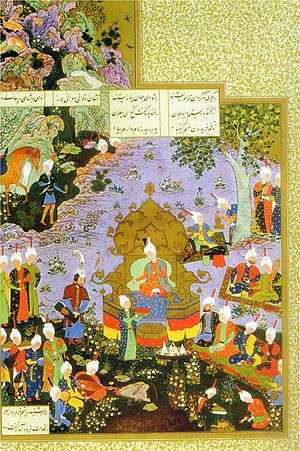Div-e Sepid
_-_Walters_W60091A_(cropped).jpg)
In the Persian epic of Shahnameh Div-e Sepid, or Div-e Sefid (Persian: دیو سپید or دیو سفید, lit. White Demon), is the chieftain of the Divs (demons) of Mazandaran. He is a huge being. He possesses great physical strength and is skilled in sorcery and necromancy. He destroys the army of Kay Kavus by conjuring a dark storm of hail, boulders, and tree trunks using his magical skills. He then captures Kay Kavus, his commanders, and paladins; blinds them, and imprisons them in a dungeon. The greatest Persian mythical hero Rostam undertakes his "Seven Labors" to free his sovereign. At the end, Rostam slays Div-e Sefid and uses his heart and blood to cure the blindness of the king and the captured Persian heroes. Rostam also takes the Div's head as a helmet and is often pictured wearing it.[1]
"White Devil" alternative views
It is written by the Royal Central Asian Society in the Journal of the Royal Central Asian Society that the struggle between Rustam and the white demon represents a struggle between Persians and invaders from the north, from the Caspian provinces.[2]
The Div Sefid is believed by scholar Joseph J. Reed to have been a northern prince.[3] The scholar Warner believes that he is a personification of the Mazandaranians, who by their climate are an unhealthy pale color.[4] Some scholars hold the opinion that these divs of Mazandaran are merely wild people of the forest.[5] Others are in the opinion that they are a group of enemy kings of ancient Mazandaran (which might have been different from its modern location) and Tabaristan.[6] It is theorized by the Folklore Society (Great Britain) that Ahriman himself was believed as having white skin.[7] Scholar P. Molesworth Sykes believes that the name "White Div" represents a white nation.[8]
According to one source Zal spoke of the horrid race of white-skinned people.[9] This however contradicts with the fact that Zal was an albino himself [10]
References
- ↑ Vesta Sarkhosh Curtis (1993). Persian Myths. University of Texas Press. ISBN 0-292-71158-1.
- ↑ Journal of the Royal Central Asian Society By Royal Central Asian Society
- ↑ P. 23 Outlines of universal history: in three parts; with a copious index to each part, showing the correct mode of pronouncing every name mentioned ... by Joseph J Reed
- ↑ P. 507 Encyclopedia of Religion and Ethics Part 16 By James Hastings
- ↑ The Wild Rue: A Study of Muhammadan Magic and Folklore in Iran By Bess Allen Donaldson
- ↑ P. 120 World Of Myths By Felipe Fernández-Armesto
- ↑ P. 173 Publications By Folklore Society (Great Britain)
- ↑ P. 137 A History of Persia By Percy Molesworth Sykes
- ↑ P. 121 Myths of the Hero: With 105 Illustrations by Norma Lorre Goodrich
- ↑ Encyclopædia Iranica, "Zal", E. Yarshater
External links
| Wikimedia Commons has media related to Div-e-Sepid. |


.png)